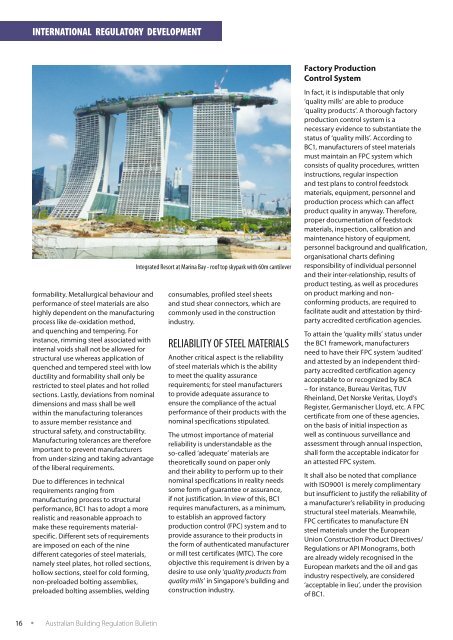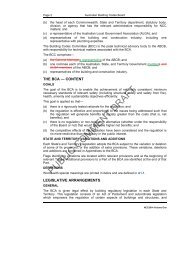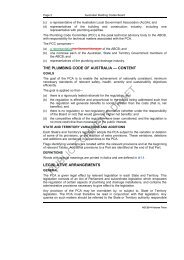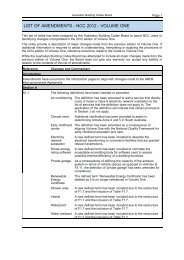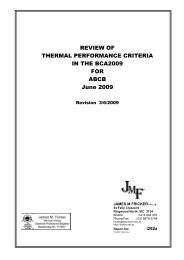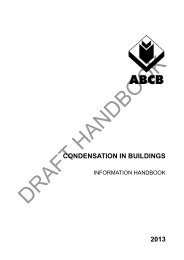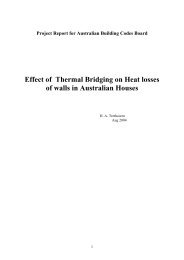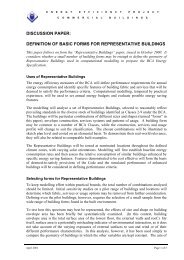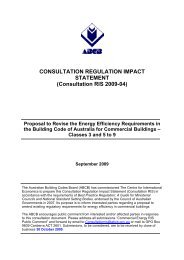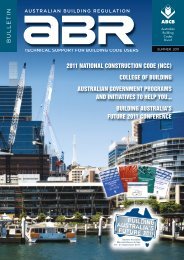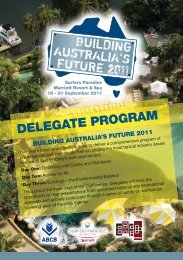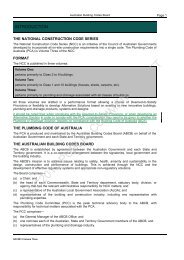PDF | 8 MB - Australian Building Codes Board
PDF | 8 MB - Australian Building Codes Board
PDF | 8 MB - Australian Building Codes Board
Create successful ePaper yourself
Turn your PDF publications into a flip-book with our unique Google optimized e-Paper software.
INTERNATIONAL Regulatory Development<br />
Factory Production<br />
Control System<br />
formability. Metallurgical behaviour and<br />
performance of steel materials are also<br />
highly dependent on the manufacturing<br />
process like de-oxidation method,<br />
and quenching and tempering. For<br />
instance, rimming steel associated with<br />
internal voids shall not be allowed for<br />
structural use whereas application of<br />
quenched and tempered steel with low<br />
ductility and formability shall only be<br />
restricted to steel plates and hot rolled<br />
sections. Lastly, deviations from nominal<br />
dimensions and mass shall be well<br />
within the manufacturing tolerances<br />
to assure member resistance and<br />
structural safety, and constructability.<br />
Manufacturing tolerances are therefore<br />
important to prevent manufacturers<br />
from under-sizing and taking advantage<br />
of the liberal requirements.<br />
Due to differences in technical<br />
requirements ranging from<br />
manufacturing process to structural<br />
performance, BC1 has to adopt a more<br />
realistic and reasonable approach to<br />
make these requirements materialspecific.<br />
Different sets of requirements<br />
are imposed on each of the nine<br />
different categories of steel materials,<br />
namely steel plates, hot rolled sections,<br />
hollow sections, steel for cold forming,<br />
non-preloaded bolting assemblies,<br />
preloaded bolting assemblies, welding<br />
Integrated Resort at Marina Bay - roof top skypark with 60m cantilever<br />
consumables, profiled steel sheets<br />
and stud shear connectors, which are<br />
commonly used in the construction<br />
industry.<br />
RELIABILITY OF STEEL MATERIALS<br />
Another critical aspect is the reliability<br />
of steel materials which is the ability<br />
to meet the quality assurance<br />
requirements; for steel manufacturers<br />
to provide adequate assurance to<br />
ensure the compliance of the actual<br />
performance of their products with the<br />
nominal specifications stipulated.<br />
The utmost importance of material<br />
reliability is understandable as the<br />
so-called ‘adequate’ materials are<br />
theoretically sound on paper only<br />
and their ability to perform up to their<br />
nominal specifications in reality needs<br />
some form of guarantee or assurance,<br />
if not justification. In view of this, BC1<br />
requires manufacturers, as a minimum,<br />
to establish an approved factory<br />
production control (FPC) system and to<br />
provide assurance to their products in<br />
the form of authenticated manufacturer<br />
or mill test certificates (MTC). The core<br />
objective this requirement is driven by a<br />
desire to use only ‘quality products from<br />
quality mills’ in Singapore’s building and<br />
construction industry.<br />
In fact, it is indisputable that only<br />
‘quality mills’ are able to produce<br />
‘quality products’. A thorough factory<br />
production control system is a<br />
necessary evidence to substantiate the<br />
status of ‘quality mills’. According to<br />
BC1, manufacturers of steel materials<br />
must maintain an FPC system which<br />
consists of quality procedures, written<br />
instructions, regular inspection<br />
and test plans to control feedstock<br />
materials, equipment, personnel and<br />
production process which can affect<br />
product quality in anyway. Therefore,<br />
proper documentation of feedstock<br />
materials, inspection, calibration and<br />
maintenance history of equipment,<br />
personnel background and qualification,<br />
organisational charts defining<br />
responsibility of individual personnel<br />
and their inter-relationship, results of<br />
product testing, as well as procedures<br />
on product marking and nonconforming<br />
products, are required to<br />
facilitate audit and attestation by thirdparty<br />
accredited certification agencies.<br />
To attain the ‘quality mills’ status under<br />
the BC1 framework, manufacturers<br />
need to have their FPC system ‘audited’<br />
and attested by an independent thirdparty<br />
accredited certification agency<br />
acceptable to or recognized by BCA<br />
– for instance, Bureau Veritas, TUV<br />
Rheinland, Det Norske Veritas, Lloyd’s<br />
Register, Germanischer Lloyd, etc. A FPC<br />
certificate from one of these agencies,<br />
on the basis of initial inspection as<br />
well as continuous surveillance and<br />
assessment through annual inspection,<br />
shall form the acceptable indicator for<br />
an attested FPC system.<br />
It shall also be noted that compliance<br />
with ISO9001 is merely complimentary<br />
but insufficient to justify the reliability of<br />
a manufacturer’s reliability in producing<br />
structural steel materials. Meanwhile,<br />
FPC certificates to manufacture EN<br />
steel materials under the European<br />
Union Construction Product Directives/<br />
Regulations or API Monograms, both<br />
are already widely recognised in the<br />
European markets and the oil and gas<br />
industry respectively, are considered<br />
‘acceptable in lieu’, under the provision<br />
of BC1.<br />
16 • <strong>Australian</strong> <strong>Building</strong> Regulation Bulletin


